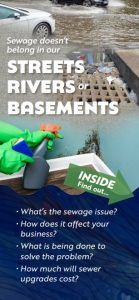Quick Links
Take Action – Fact Sheets – Local Contacts – Background Information
Your voice is critical
Use these resources for community outreach and education on ways to reduce sewage overflows and flooding in your community.
Take Action
 New Combined Sewer Overflow Outreach Brochure
New Combined Sewer Overflow Outreach BrochureUse this brochure to educate and inform small business owners on the combined sewer overflow problem, solutions, and options to fund needed sewer upgrades.
Versions of the brochure to download, share and print: Brochure .pdf – brochure .pdf for printing (crop marks and bleed) – brochure .pdf (bleed) – folding instructions.
Green Infrastructure: Save Money and Deliver Local Benefits (downloadable flyer)

Green infrastructure is a cost-effective solution for combined sewer overflows that contributes to emissions reductions and utility energy bill savings, creates jobs and promotes local economic development, and supports adaptation and resilience. Use this flyer to show decision-makers the benefits of using green infrastructure to reduce combined sewer overflows.
Action Guide
Use this action guide to get the word out about what residents, elected officials, community-based organizations, and small businesses can do to ensure that combined sewer overflow plans include community preferences. Sewage-Free Streets and Rivers Action Guide (downloadable)
Template Flyers
Use this set of two flyer templates to educate the general public on combined sewer overflows, flooding, and CSO solutions. Any type in red can be customized to a specific city. Our City’s Plumbing Problem (downloadable) and Combined Sewer Overflow Solutions (downloadable)
New – Spanish and Portuguese versions:
- Our City’s Plumbing Problem (downloadable) Spanish
- Combined Sewer Overflow Solutions (downloadable) Spanish
- Our City’s Plumbing Problem (downloadable) Portuguese
- Combined Sewer Overflow Solutions (downloadable) Portuguese
Fact Sheets on the CSO Long Term Control Plans
To assist community members and those who are interested in the contents of the CSO Long Term Control Plans, the Sewage-Free Streets and Rivers campaign has developed a series of fact sheets that highlight the most pertinent information for communities to know, such as the cost of the projects and implementation.
Download the fact sheets for Bayonne, Camden County Municipal Utilities Authority, Elizabeth, Harrison, Kearny, Jersey City Municipal Utilities Authority, Newark, North Hudson Sewerage Authority, Paterson, and Perth Amboy.
Local Contacts
Connect with local groups, community members, and your municipality or utility.
- Use this Directory to connect with cities and utilities with CSO permits.
- Connect with groups like Newark DIG and Camden SMART who have been working in communities with combined sewer systems to reduce flooding and sewage overflows and find green solutions.
- Learn about the Clean Waterways, Healthy Neighborhoods initiative, a collaboration of the entities that own and operate combined sewer systems within the Passaic Valley Sewerage Commission (PVSC) and North Bergen Municipal Utilities Authority (NBMUA) service areas.
Find out whether your sewer is overflowing:
-
- Notification system for the City of Bayonne, Borough of East Newark, City of Elizabeth, Borough of Fort Lee, Town of Guttenberg, City of Hackensack, Town of Harrison, Jersey City MUA, Town of Kearny, City of Newark, North Bergen MUA – Central, North Bergen MUA – Woodcliff, City of Paterson, City of Perth Amboy, Village of Ridgefield Park.
- Notification system for West New York, Weehawken, Union City, Hoboken
Background Information
Download – The New Jersey Combined Sewer System Fact Sheet
NJDEP CSO website—The New Jersey Department of Environmental Protection has a website devoted to the combined sewer overflow permit. Find resources on the permit and a map of combined sewer overflows in New Jersey.
Jersey Water Works, a collaborative group of organizations and individuals working to improve New Jersey’s water infrastructure, including wastewater and sewer systems has a committee focused on CSOs and a web page devoted to CSOs in New Jersey.
Ripple Effects—This report explores urban water infrastructure in two ways: the state of water infrastructure in New Jersey cities, and why it matters.
Water Infrastructure in New Jersey’s CSO Cities—This report was developed by a Rutgers University team led by Daniel J. Van Abs Ph.D. PP AICP. It focuses on the 21 New Jersey municipalities that have combined sewer systems and examines issues regarding water supply and wastewater capacity for these municipalities. The Water and Sewer System Ownership and Management Map gives a detailed review of water and sewer system ownership and management, including collection systems and treatment plants, in New Jersey CSO municipalities.
